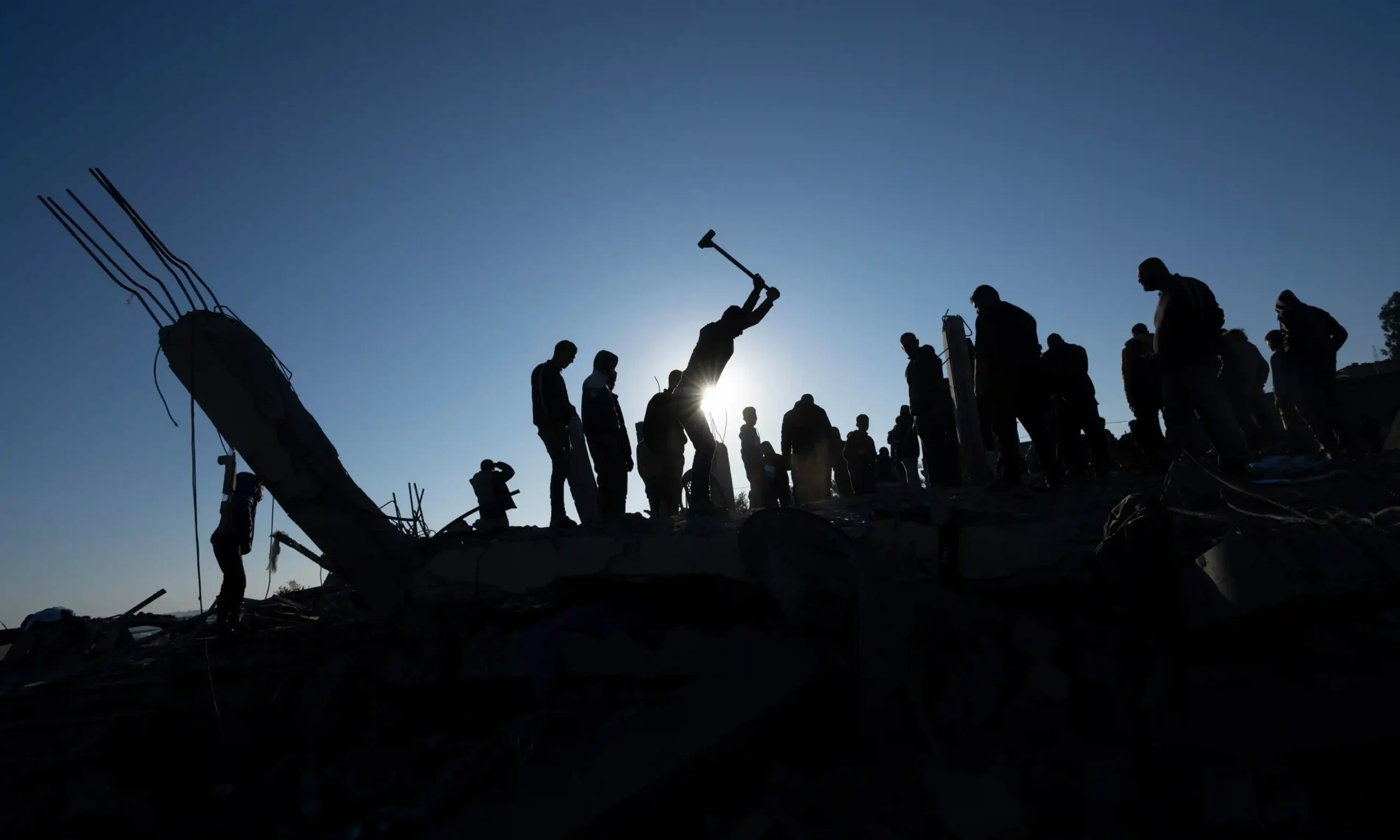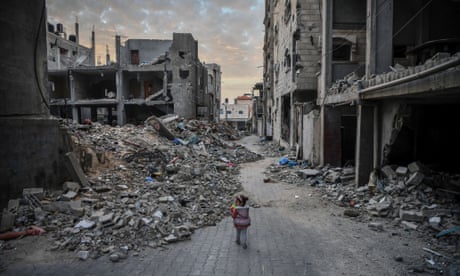
‘Every time Gaza has come under attack, I’ve thought of my uncle.’ Palestinians search the rubble of a house in Rafah, Gaza, 7 January 2024. Photograph: Fatima Shbair/AP
On 7 December, a dark cloud floated across my computer screen: a photograph of a man’s face. I wouldn’t have noticed it if it didn’t look like me.
“An Israeli missile kills Palestinian poet and author Saleem Al-Naffar and his family members in their home in Gaza,” I read on Arabic Wikipedia.
It made me have a flashback: I think I met him. I’m pretty sure we are relatives!
Seventy-five years before 7 October, the Nafar family lived in Yafa (which Israelis now call Jaffa). The Nakba and the creation of the state of Israel forcibly removed us, alongside 75% of the Palestinian population. Our family, like tens of thousands of other Palestinian families, was shattered and split apart. My grandfather fled to Askalan (now Ashkelon) and then to Lyd (now Lod), which became cities in the new state; the rest of my family to refugee camps in Ramallah, Lebanon, Gaza and other places.
I’m sure Saleem and I are relatives, I thought. He looks like all of my uncles. But death can be confusing, especially when it hits you like a missile.
Twenty years ago, my dad called me while he was chatting on MSN Messenger. “Tamer, meet our relative from Gaza. He is a poet,” he said. “Saleem, meet my eldest son, Tamer. He is a well-known rapper.”
I remember I was upset that he didn’t give a damn that I was a hotshot rapper. Only now, when I look back, do I realise that I didn’t give a damn that he was a poet. I didn’t even care to be part of a conversation between two of my elders who were sharing memories of my roots and ancestry. Instead, I was busy writing or recording as usual; just busy being the self-centred young rapper I was.
Every time Gaza has come under attack I’ve thought of him, but I couldn’t remember his full name. Suddenly, reading about his death, I did. And it was he who made the effort. He walked for dozens of miles and for 20 years, straight to my screen, just to remind me of what he was called: Saleem Al-Naffar, with the small addition of “RIP” after it. The reason I didn’t find him before is because of the “Al-” before Naffar, which together mean “The Naffar”. I dropped the “Al” so western people could pronounce it – but they still get my name wrong.
If I had found Saleem, I wonder what I would have texted him. Would I have even dared to send him a message at all? Being a Palestinian citizen of Israel, I fear I could get arrested by Israeli police just for contacting my cousin in Gaza. Would Israel accuse me of being associated with terror? To Israel, it seems, every Palestinian in Gaza is associated with terror. It doesn’t matter that my late cousin was a poet who wrote and published hundreds of poems. If Israel says he is a terrorist, then he is a terrorist.
But let’s say I did message him – maybe something like, “Sorry for being a jerk and not paying attention on that MSN call. I’m different now.” Maybe a simple, “How are you?” He’d probably say, “Zay al zift [like shit]. I lost my brothers and sisters and there is no food or water.” I’d have no idea how to reply to that.
I don’t know what’s more shocking: the fact that Israel, with the full support of the United States, can bomb and besiege 2 million Palestinians for three months, kill thousands of civilians, block the entry of food, water, electricity, fuel and medicine and cut telecommunications; or that leaders of the modern world, many of whom proclaim to uphold the values of human rights and freedom, are just watching. Or the fact that the same modern world hasn’t developed the relevant emoji for me to reply to the imaginary text from Saleem. How would I respond to him? A smiley with a tear? That works when someone tells you he has the flu or couldn’t find tickets to a Drake concert; not when someone’s entire family has been wiped out.

So I missed that chance to have a conversation with him. If we’d spoken before, maybe we’d have enriched each other with our different tastes in poetry. Maybe he’d have sent me some classical poems to help me achieve new depth in my work. And maybe I’d have sent him some hip-hop to shake up his sedate style. If I could contact him now, I’d send him the album Distant Relatives by Damien Marley and Nas, whose title explains the idea that all black people were relatives before slavery, but, because of the African diaspora, they became distant. Just like us, Saleem.
I hope he is with my dad now in heaven. It doesn’t make sense for Palestinians to go through hell twice. Or move from one nothingness to another.
“You who is looking for a way to redemption – you are not alone.” This line was written by my distant relative who was killed in an Israeli attack, along with his wife, his two daughters and his son.
- Tamer Nafar is a Palestinian rapper, actor, writer and columnist based in London






